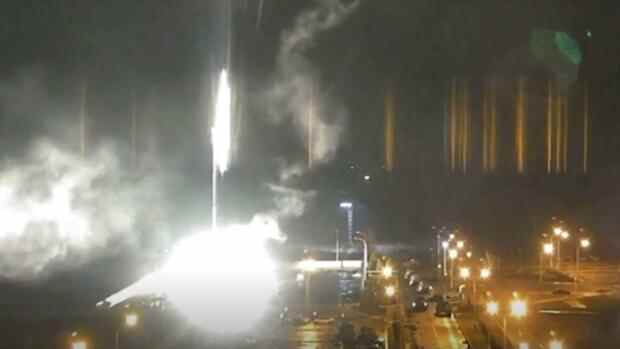This image, taken from video released by the Zaporizhia Nuclear Power Plant, shows a bright flare-up – possibly a Russian missile – impacting the site of the nuclear power plant.
(Photo: dpa)
Michael Sailer, internationally renowned expert on the safety of nuclear power plants, warns of unforeseeable dangers due to the fighting surrounding the Zaporizhia nuclear power plant in southern Ukraine. “The situation is still unclear. Regardless of how things develop today, I see risks that cause me serious concern,” Sailer told Handelsblatt. “Even if reactor operation should remain stable, the dangers are immense,” Sailer warned.
Russian troops are said to have fired on Europe’s largest nuclear power plant. According to the nuclear power plant operator, a fire broke out on the site on Friday night. This has now been deleted.
Sailer refers to the large storage facilities for spent fuel elements that are in the immediate vicinity of the reactors in Zaporizhia. The fuel rods would have to be permanently cooled with water, said Sailer. “Should the cooling water escape – for example due to explosions or shelling – the cooling of the fuel elements would be disrupted or would fail completely.”
It would then be almost impossible to avoid “a massive release of radioactivity after a few days,” said Sailer. There is also a container storage facility in Zaporizhia without cooling water. “There, too, massive shelling could lead to the release of radioactivity,” said Sailer.
Top jobs of the day
Find the best jobs now and
be notified by email.
According to Sailer, a worst-case scenario cannot be ruled out: “Should the power supply collapse and the emergency power generators at the nuclear power plants fail at the same time, a core meltdown could hardly be stopped. Then we would have a second Fukushima,” he warned.
The long-standing head of the Öko-Institut was chairman of the Waste Management Commission (ESK) until 2019 and a member of the Reactor Safety Commission (RSK) from 1999 to 2014. Sailer was also a member of EURATOM’s Scientific & Technical Committee.
More: Incident shows ruthlessness: reactions to the nuclear power plant fire
